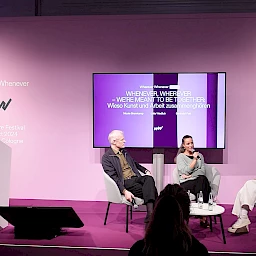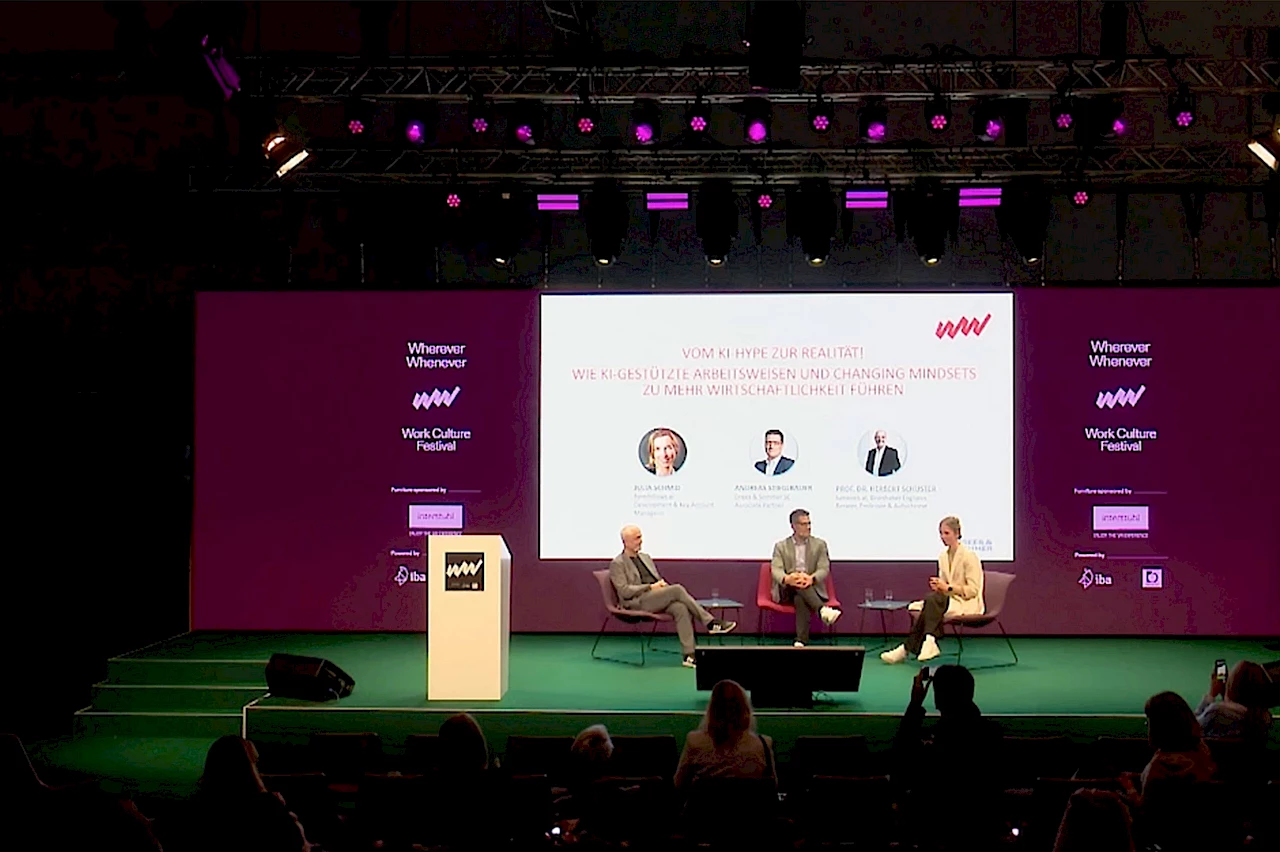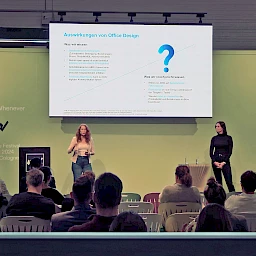What can AI really do? And how can technology and humanity be combined in a meaningful way? At the Work Culture Festival panel titled From AI Hype to Reality, digitalisation expert Professor Herbert Schuster discussed with Julia Schmid and Andreas Stieglbauer from Drees & Sommer what working with AI could look like in practice and what companies should bear in mind when doing so.
More than just hype: AI is here to stay
The experts were unanimous in their assessment of the current situation: the initial hype surrounding AI has given way to an objective, increasingly strategic debate. “We have seen many trends in recent decades. But this time it’s bigger,” emphasised Professor Herbert Schuster. Artificial intelligence is no longer an abstract future scenario, but has instead arrived in people’s everyday lives. Tools such as ChatGPT have achieved broad social relevance and created a wow effect that is hardly comparable with previous technological advances. The dynamics are also noticeable in the corporate context. Processes are changing, entire job profiles are changing — and with them the expectations of employees and managers. AI will not disappear, but will continue to expand its role in the world of work. The panel members were certain that anyone talking about work culture today can no longer avoid the issue of AI. The question is no longer whether AI is coming, but how it can be integrated in a meaningful way.
AI creates new ways of working: Between efficiency and empowerment
Julia Schmid reported on her practical experience at Drees & Sommer: “We use AI to analyse complex requirements in building planning and to optimise processes based on data.” Her internal corporate venture formfollows.ai develops intelligent applications that automatically generate suggestions for room concepts based on user requirements, spatial parameters and operating data. The added value is that planners are relieved of time-consuming analysis and routine tasks and gain space for creative, design and strategic decisions. Andreas Stieglbauer confirmed this trend: “We are experiencing a fundamental change — not only in the way software is developed, but also in the way decisions are made.” Standards and expectations have shifted within a very short space of time: what used to be a complex planning process can now be prepared and simulated with just a few clicks. The demand for precision and individualisation is increasing, while the pace is accelerating at the same time. This is precisely where AI can build a bridge between technical excellence and human intuition for the right path.
The focus stays on people
Despite all the technological possibilities, the panel agreed that the focus of every AI application has to be on people. Julia Schmid emphasised that it’s indispensable to have humans in the loop, i.e. people as an active part of the decision-making chain. It’s not about replacing human decisions with machines, but about an intelligent supplement in which technology supports and strengthens people. In change management in particular, it is important to involve employees at an early stage, to empower them and to actively offer them creative freedom. Professor Schuster also pleaded for a conscious approach: just because AI can take on certain tasks does not mean that it always has to do so. In some cases, it makes more sense to deliberately leave processes to people — for example, if these processes contribute to identification with the company or promote motivation and a sense of purpose. Technology should not replace people, but empower them. An appreciative approach to human performance remains indispensable even in the age of automation. Ultimately, the unanimous opinion is that it is not just about efficiency, but also about responsibility.
AI-assisted planning: Data, design and dialogue
Technology meets emotion in building planning and workplace design. The task is to coordinate and integrate a wide range of requirements. “AI can analyse large amounts of data and thus help to develop optimal designs for office space. But that is no substitute for talking to people on the ground,” emphasised Schmid. A dialogue with users is still needed in order to understand requirements and develop appropriate solutions. Andreas Stieglbauer also referred to the tension between cost pressure, space reduction and the desire for appealing, inspiring working environments. “A good office can be a centre of attraction. But ultimately, people come for the people.” This is precisely why social space, i.e. places for meeting, exchanging ideas and informal learning, is becoming increasingly important in planning. Modern working environments must therefore not only be functional, but also emotionally connectable. This can only be achieved through an integrative planning approach that combines data-based findings with human experience.
Sociality, soft skills and change as an opportunity
AI can take over repetitive tasks — this makes room for what machines cannot do: personal interaction. Exchanges, spontaneous conversations, mutual understandings become real added value. “Small talk used to be unproductive time, today we call it socialising and recognise its value for collaboration and creativity,” says Schuster. Especially in hybrid work contexts, social bonding is crucial for functioning teams and innovative strength. At the same time, a change in mentality is needed at all levels. “Some managers still think in old performance categories,” says Stieglbauer. “But an attractive photo of the new office on LinkedIn is not enough. It’s about real change and participation.” Companies must have the courage to actively involve employees in change processes and allow new forms of collaboration. The panel participants all agreed that companies who use AI must not only integrate the technologies, but also get people to go along. “We need to talk to the employees: what gets on your nerves? What can AI take off your hands?” This could also motivate sceptical colleagues to embrace the new possibilities. A fair deal is important, says Schuster: “If we gain time through AI, we should share this gain — for example by working one hour less per day.”
The discussion made it clear that AI is not successful of itself, but a catalyst for necessary changes. It challenges existing routines and at the same time opens up new opportunities for more efficient, people-centred processes. Not everything is possible yet, but development is progressing rapidly. The experts came to an optimistic assessment: “This is only the beginning of a huge opportunity space. The decisive factor is not what the technology can do, but what we make of it.”
Please also read

Andreas Stieglbauer is an architect and Associate Partner at Drees & Sommer. He has been involved in the design of modern working environments for more than 15 years. Together with his team, he supports companies and public institutions in the development and implementation of sustainable workplace concepts — always with the aim of combining functionality with emotional quality. Further information is available at: https://www.linkedin.com/in/andreas-stieglbauer-a4034b227/
Julia Schmid is a specialist in artificial intelligence and digital business models at Drees & Sommer. She is part of the company’s own start-up formfollows.ai, where she is responsible for key account management and user-centred product development. With her background in innovation management, she develops data-based solutions to optimize planning and operating processes in the building sector. Further information is available at: https://www.linkedin.com/in/julia-schmid-german/
Professor Herbert Schuster is a business IT specialist and expert in digital transformation. Among other things, he was CIO at SNP Schneider-Neureither & Partner SE and previously Dean of the Faculty of Computer Science at SRH University Heidelberg. In recent years, he has held various academic and advisory positions, including at the University of Applied Management Studies (HdWM), the Fachhochschule des Mittelstands (FHM) and as Executive Advisor at lumentis ai. He is also a member of the Supervisory Board of Grieshaber Logistics Group AG. His focus is on the practical combination of digitalization, entrepreneurship and education. Further information is available at: https://www.linkedin.com/in/prof-dr-herbert-schuster-57651129/
Cover photo: IBA






